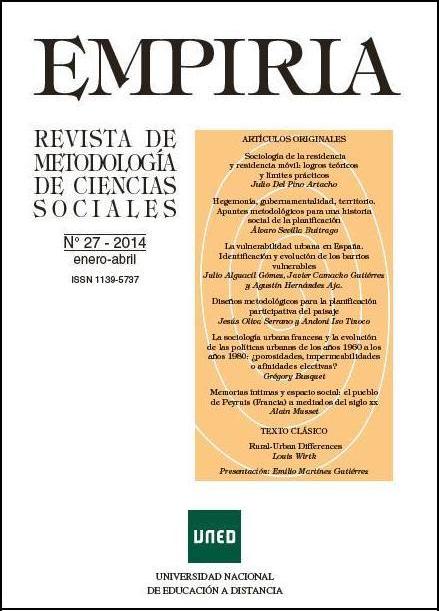French urban sociology and urban policies development from the 1960s to the 1980s: porosity, impermeability or elective affinity?
DOI:
https://doi.org/10.5944/empiria.27.2014.10865Keywords:
urban sociology, town planning, urban policies, social movementsAbstract
French urban sociology developed in conjunction with French urban policy since the 1960s. By the time these policies were approaching the urban as a whole, sociology was doing the same. In the late 1970s, when sociology was focusing on the local level, town planning was evolving in a similar manner. A heterogeneous set of actors contributed to this evolution: from the “second left wing” to Marxist sociologists, including urban social movements and the ideas they conveyed, such as the relatively new “participatory democracy”, or the older – “mixed residential areas” (as opposed to segregation) or “spatial determinism”. In doing so, a gradual de-politicization of the discipline occurred and, more broadly, of the urban and of the social issues. This indicates a shift in the social uses of urban sociology and in sociologists’ relation to power. While the ideas guiding urban policies and the attempt to apprehend and understand urban societies in reality remained the same, what varied was a matter of scale, as well as of political vision that ran out.
Downloads
Downloads
How to Cite
Issue
Section
License
Los autores que publican en esta revista están de acuerdo con los siguientes términos:a) Los autores conservan los derechos de autor y garantizan a la revista el derecho de ser la primera publicación del trabajo al igual que licenciado bajo una Licencia Internacional Creative Commons CC BY-NC-SA 4.0.
b) Se permite y se anima a los autores a difundir electrónicamente las versiones pre-print (versión antes de ser evaluada) y/o post-print (versión evaluada y aceptada para su publicación) de sus obras antes de su publicación, ya que favorece su circulación y difusión más temprana y con ello un posible aumento en su citación y alcance entre la comunidad académica.












